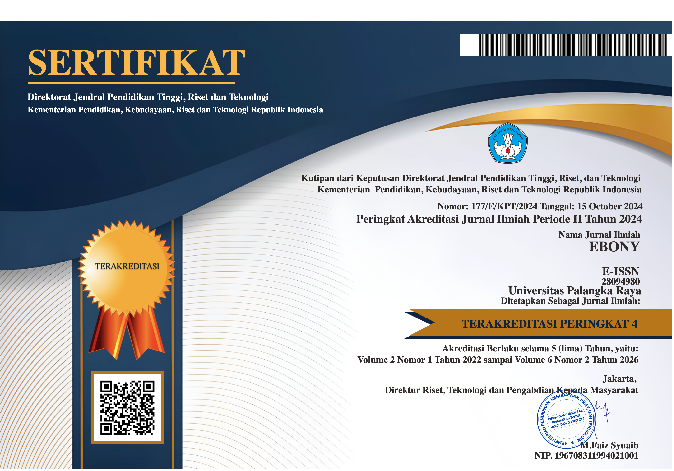The Correlation Between Self-Efficacy and Speaking Performance of the Eleventh-Grade Students at SMAN 1 Palangka Raya
DOI:
https://doi.org/10.37304/ebony.v3i2.8599Keywords:
self-efficacy, speaking performance, correlational studyAbstract
Speaking is a common English skill which is still difficult to master in Indonesia. Especially in secondary school contexts, many students cannot use English for communication functions although they have studied it for several years. As the modern era demands the need of communication skills, this research was initiated to discover whether there is a correlation between self-efficacy and students’ speaking performance to help them improve their speaking skill. The study was conducted with a sample of 40 high school students from class XI MIPA 2 of SMAN 1 Palangka Raya. To collect the data, self-efficacy questionnaire, speaking test, and documentation of students’ latest speaking scores and teacher’s notes of students’ activeness in English class were used. The data then was calculated and analyzed using IBM SPSS Statistics 25 Program. It was found there was a weak correlation (r-count = 0.333) between the two variables. The level of students’ self-efficacy was moderate, but their level of speaking ability was high. Therefore, the study concluded self-efficacy has little or no direct effect on students’ speaking performance. It is suggested that English teachers can continue to improve students’ speaking skill and further research is conducted to find more evidence of this phenomenon.
Downloads
References
Andriani, I. Y., Zuhairi, A., Karimullah, I. W. (2019). The Relationship between Students’ Self-Eficacy and Their Speaking English Proficiency. Journal of English Education Department, University Of Islam Malang, 14(11). Retrieved from: http://riset.unisma.ac.id/index.php/jp3/article/view/3861
Aryani, R. (2018). The Relationship Of Students’ Speaking Self-Efficacy, Collocational Competence, And Their Speaking Performances (A Correlational Study At Seven Senior High Schools In Sukabumi Regency). English Education Department, State Islamic University Of Syarif Hidayatullah, Jakarta, Indonesia. Retrieved from: https://repository.uinjkt.ac.id/dspace/bitstream/123456789/41923/1/RISA%20ARYANI-FITK.pdf
Asakereh, A. & Dehghannezhad, M. (2015). Student Satisfaction with EFL Speaking Classes: Relating Speaking Self-Efficacy and Skills Achievement. Issues in Educational Research, 25(4), 345-363. Retrieved from: http://www.iier.org.au/iier25/asakereh.html
Fauzi, I. & Asi, N. (2023). Examining Speaking Anxiety of Indonesian Learners of English: A Case of University Students. Indonesian Journal of English Language Teaching and Applied Linguistics, 7(2), 263-275 DOI: http://dx.doi.org/10.210 93/ijeltal.v7i2.1338
Folse, K. (2006). The Art of Teaching Speaking. Michigan: Michigan University Press.
Heaton, J.B. (1978). Writing English Language Test. Longman Handbooks for Language Teachers. New York: Longman Inc.
Maier, S. F., & Seligman, M. E. P. (2016). Learned helplessness at fifty: Insights from neuroscience. Psychological Review, 123(4), 349–367. Retrieved from: https://doi.org/10.1037/rev0000033
Maharani, R. (2022). The Correlation Between EFL Students’ Self-Efficacy And Their Speaking Ability. Research on English Language Teaching in Indonesia, 10(1), 156-163. Retrieved from: https://ejournal.unesa.ac.id/index.php/retain/article/view/47586
Mastur. (2016). The Relationship Between Students’ Self-Efficacy and Their Speaking Ability (A Study at MTsS Al-Manar Aceh Besar). UIN Ar Raniry Library. Retrieved from: https://repository.ar-raniry.ac.id/id/eprint/552/
Ningrum, R. P., Husna, L., & Tanjung, F. (2017). The Correlation between Self- Confidence and Speaking Ability of the Third Year Student of English Department at Bung Hatta University. University of Bung Hatta, Indonesia.
Ocarina, D. V., Anwar, K., & Marifah, U. (2022). The Correlation between Students’ Speaking Self-Efficacy and Collocation Competence in Speaking at SMPN 1 Parengan. Journal of English Teaching, Literature, and Applied Linguistics, 5(2), 101-108. Retrieved from: http://journal.umg.ac.id/index.php/jetlal/article/view/3742
Paradewari, D. S. (2017). Investigating Students’ Self Efficacy of Public Speaking. International Journal of Education and Research, 5(10), 97–108. Retrieved from: https://www.ijern.com/journal/2017/October-2017/09.pdf
Rao, Parupalli S. (2019). The Importance of Speaking Skills in English Classrooms. Alford Council of International English & Literature Journal (ACIELJ), 2(2), 1-12. Retrieved from: https://www.acielj.com/Papers/vol2issue2/1.ACIELJ%20-Srinu%20sir%20(1-12)%20OK.pdf
Rosaria, Y. B. (2017). Students’ Self-efficacy to Perform Speech in Public Speaking Class. English Education Department, Sanata Dharma University, Yogyakarta, Indonesia. Retrieved from: https://repository.usd.ac.id/21458/2/131214020_full.pdf
Sanavi, R. V., & Tarighat, S. (2014). Critical Thinking and Speaking Proficiency: A Mixed-method Study. Theory and Practice in Language Studies, 4(1), 79-87. Retrieved from: https://www.researchgate.net/publication/274117011_Critical_Thinking_and_Speaking_Proficiency_A_Mixed-method_Study
Schwarzer, R., & Renner, B. (2000). Social-cognitive predictors of health behavior: action self-efficacy and coping self-efficacy. Health psychology: official journal of the Division of Health Psychology, American Psychological Association, 19(5), 487–495.
Schwarzer, R. (2014). Self-Efficacy: Thought Control of Action. Taylor & Francis.
Schwarzer, R., & Hamilton, K. (2020). Changing Behavior Using the Health Action Process Approach. The Handbook of Behavior Change, 89–103. Retrieved from: https://doi.org/10.1017/9781108677318.007
Sharma, H. L., & Nasa, G. (2014). Academic Self Efficacy: A reliable Predictor of Educational Performances. European Centre for Research Training and Development UK. Retrieved from: https://eajournals.org/bje/vol-2issue-3july-2014/academic-self-efficacy-reliable-predictor-educational-performances-2/
Suharja, S. (2020). The Correlation Of Self Efficacy To The Students’speaking Performance In EFL Context At University Of Dayanu Ikhsanuddin Baubau. English Education Journal, 17-25. Retrieved from: https://www.ejournal.lppmunidayan.ac.id/index.php/english/article/view/285
Syarif, N. W. (2018). The Relationship between Students Self-Efficacy and their Speaking Ability at English Education Department Unismuh Makassar (A Descriptive Research at the English Education Department Unismuh Makassar). English Education Department, Makassar Muhammadiyah University, Indonesia. Retrieved from: https://digilibadmin.unismuh.ac.id/upload/3606-Full_Text.pdf
Widiati, U., Rohmah, Z., & Furaidah. (2017). English Textbook for X Grade of Senior High School (3rd Edition). Jakarta: Indonesian Ministry of Education and Culture.
Yoskapela. (2021). A Study on Speaking Anxiety of English Education Study Program Students at University of Palangka Raya. English Education Department, University of Palangka Raya, Indonesia.
Zhou, M. (2016) A Revisit of General Self-Efficacy Scale: Uni- or Multi-dimensional? Current Psychology, 35, 427–436. http://dx.doi.org/10.1007/s12144-015-9311-4
Downloads
Published
How to Cite
Issue
Section
License
Copyright (c) 2023 Christy Givency

This work is licensed under a Creative Commons Attribution 4.0 International License.











